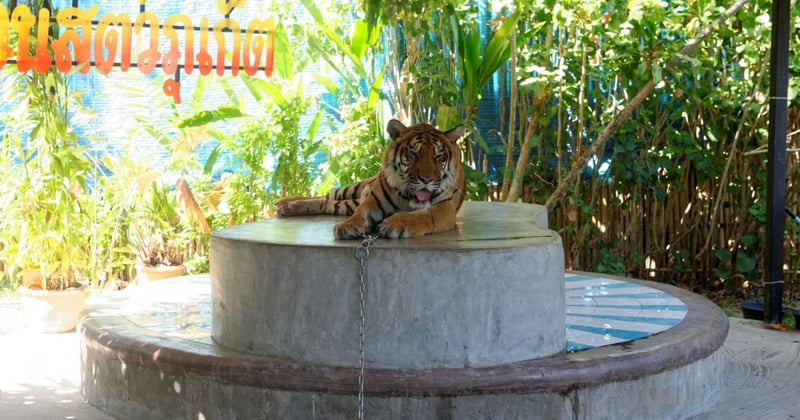
Tiger Selfies Exposed
News
New report reveals the true scale of Thailand’s tiger tourism.
In the wake of the scandal surrounding Thailand’s Tiger Temple, World Animal Protection is exposing the true scale of abuse captive tigers endure at the hands of Thailand’s tiger tourism industry.
Launched ahead of International Tiger Day (29th July), our ‘Tiger selfies exposed: a portrait of Thailand’s tiger entertainment industry’ report highlights the role government, the travel industry and tourists play in the tiger entertainment industry.
Thailand is a hotspot for tiger tourism – attractions are widely promoted by travel companies and online travel sites for tourists to get up close and personal with a captive tiger for a ‘once in a life-time’ encounter.
More tigers for a growing market
The report reveals a rapidly expanding industry, with a third more captive tigers (33%) in Thailand in the past five years. At the time of our investigations, there were 830 tigers in captivity at entertainment venues in Thailand, compared to the 623 when we first researched this issue in 2010.
The growing numbers of tigers, is worrying as it indicates ‘speed-breeding’ of captive tigers without any conservation benefits and means more tigers are born into suffering. Our investigations also uncovered discrepancies in reported versus observed tiger numbers which raise some serious questions.
Besides an alarming trend in the growing numbers of tigers involved, the report lays bare the intense cruelty that makes tigers submissive enough to entertain tourists.
The suffering behind the selfie
The main welfare concerns witnessed by our investigators at these venues were:
- tiger cubs separated from their mothers just two to three weeks after birth
- young cubs presented to tourists and mishandled hundreds of times a day, which can lead to stress and injury;
- tigers punished using pain and fear, to stop aggressive, unwanted behaviour. One staff member told our researchers that starvation is used to punish tigers when they make a ‘mistake’;
- most tigers were housed in small concrete cages or barren enclosures with limited access to fresh water. 50% of the tigers we observed were in cages with less that 20sqm per animal, a far cry from the 16-32km they would roam in a single night in the wild; and
- one in 10 tigers observed showed behavioural problems, such as repetitive pacing or biting their tails. These behaviours most commonly occur when animals can't cope with stressful environments.
Of the 17 tiger entertainment venues investigated, Sriracha Tiger Zoo in Pattaya has the highest number of tigers in captivity. It’s also the venue where we observed the poorest animal welfare conditions – with at least one tiger so thin the hips and ribs were visible.
Nicola Beynon, head of campaigns in Australia for World Animal Protection said: “Animal lovers on their holidays are unwittingly funding an industry that depends on wild animals being beaten into submission in order to pose for photos.
“We’re asking tourists to think about the welfare of the tigers and avoid tiger selfies. If you can get up close, hug or have a selfie with a tiger chances are that animal has been subjected to cruelty.”
Travel companies and tour operators also have a role to play. TripAdvisor, the largest travel site in the world, has an immense influence on the tourism industry. But it is choosing to profit from the abuse of wild animals in tourist entertainment rather than help protect them. TripAdvisor continues to promote and sell tickets via its subsidiary Viator, to the world’s cruellest wildlife entertainment attractions, like the Sriracha Tiger Zoo.
“We’re also calling on the travel industry to stop promoting and profiting from tiger cruelty. TripAdvisor continues to promote and sell tickets to cruel tiger tourist venues. Instead, they could be a real part of the solution and help to end the suffering of tigers,” Ms Beynon said.
World Animal Protection is calling for:
- Captive breeding of tigers should be limited to projects with internationally acknowledged conservation benefit. All other tiger breeding must be banned.
- TripAdvisor and other travel companies to end their sales and promotion of cruel wildlife entertainment attractions
- Travellers to stay away from any wildlife tourist entertainment venues that allows direct human-animal interaction, such as selfies with tigers or tiger cub feeding.